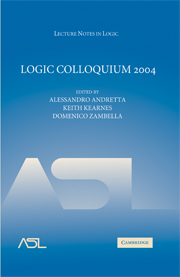Book contents
- Frontmatter
- Contents
- Introduction
- Speakers and Titles
- Abstract elementary classes: some answers, more questions
- On the density of Hausdorff ultrafilters
- Zero-groups and maximal tori
- Constructive set theory with operations
- Parametrized local zeta functions
- Colourings of hypergraphs, permutation groups and CSP's
- Tolerance intersection properties and subalgebras of squares
- Universes in type theory part I—Inaccessibles and Mahlo
- Hausdorff-dimension and weak truth-table reducibility
- Computation and the explanation of intelligent behaviours: ethologically motivated restart
- Constructible sheaves and definability
- An overview of modern universal algebra
- Lecture Notes in Logic
Parametrized local zeta functions
Published online by Cambridge University Press: 05 July 2014
- Frontmatter
- Contents
- Introduction
- Speakers and Titles
- Abstract elementary classes: some answers, more questions
- On the density of Hausdorff ultrafilters
- Zero-groups and maximal tori
- Constructive set theory with operations
- Parametrized local zeta functions
- Colourings of hypergraphs, permutation groups and CSP's
- Tolerance intersection properties and subalgebras of squares
- Universes in type theory part I—Inaccessibles and Mahlo
- Hausdorff-dimension and weak truth-table reducibility
- Computation and the explanation of intelligent behaviours: ethologically motivated restart
- Constructible sheaves and definability
- An overview of modern universal algebra
- Lecture Notes in Logic
Summary
Abstract. We extend further the theory of parameterized p-adic integrals, using the recently proven cell decomposition for subanalytic sets and functions. We construct a framework of (analytic) constructible functions (including parameterized local zeta functions) which is stable under integration. We bound the multiplicity of the complex poles of these integrals, uniform in the parameters. Finally, following Denef, we give an application to Poincaré series attached to the counting of well determined points modulo pn for natural numbers n.
introduction. Parametrized p-adic integrals are being better understood recently by the work of Denef in an algebraic context and the work of the author in an analytic context (and, by the theory of motivic integrals, but we will not treat uniformity questions here). In this paper we give a contribution to the theory of p-adic integrals, based on the Cell Decomposition Theorem of [3]. In [3], a framework of constructible functions which is stable under integration is introduced. Here we extend the notion of constructible functions such that parametrized (possibly twisted) local zeta functions, which are p-adic integrals of quite a general form, are included, and we prove that it is stable under p-adic integration. We control the possible order of poles of the zeta functions, uniform in the parameters.
- Type
- Chapter
- Information
- Logic Colloquium 2004 , pp. 84 - 92Publisher: Cambridge University PressPrint publication year: 2007

